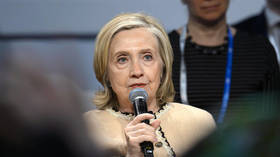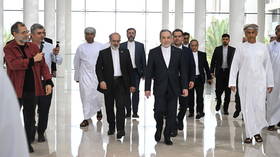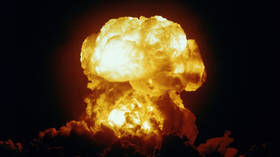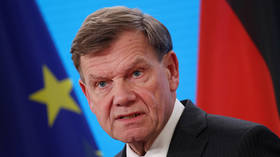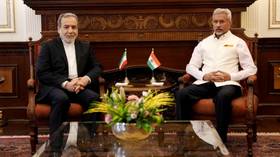‘US casting its net around Asia‘
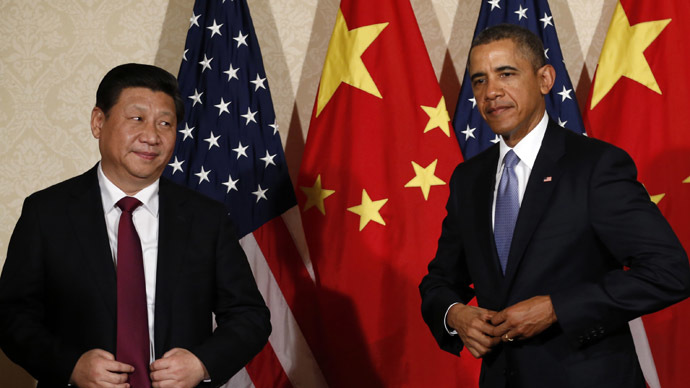
President Obama's “pivot to Asia” is largely rhetorical alongside the natural rise of China, but the risk is that the US will become ensnared in a military conflict by politically opportunistic allies, Australian historian Geoffrey Gunn told RT.
This is already happening with US backing for Japan's claim over the disputed Senkaku/Diaoyu Islands and in backing the Abe government's position on “collective self-defense” said Gunn during a discussion on Japan. He is Professor Emeritus at Nagasaki University and a leading Australian historian.
Andre Vltchek:After the visit of the President of the United States Barack Obama to Asia, what really did change, and what did the West achieve?
Geoffrey Gunn: The President of the United States was noticeably absent from the summit in Bali, Indonesia, last year. It seemed that the “US pivot to Asia” was losing its focus, becoming fuzzy. Simply, Obama had to show his face. This time he had chosen a different constellation of countries. He visited Japan. We know that he declined to stay at the official guesthouse, choosing a private hotel, thereby putting a little distance between himself and Prime Minister Abe. Then he went to South Korea, again reaffirming the alliance, and the US commitment to holding the fort. And then, surprisingly, a visit to Malaysia, a country that no US President had visited for decades. It seems to make little sense, except that the US was casting its net around, perhaps, for a naval base, or more precisely for base rights for US warships, perhaps reaffirming solidarity with the so-called ‘moderate Muslim nation’. But again, he did not revisit Indonesia, which is the largest economy in Southeast Asia and Washington’s best, and most loyal friend. Manila fits into the equation, too, because here, the US is seeking to renegotiate base rights; literally to renegotiate the Senate decision to expel US bases, in the early and mid 1980’s. One can see a pattern in this visit by Obama, basically, with the “elephant in the room”, of course, being China. With Obama probably looking ahead to firming-up the strategic alliance with Japan, bringing in Singapore, bringing in Malaysia, bringing in South Korea, and even now bringing in Vietnam.
AV:You mentioned Indonesia, which recently went through a turbulent election. Results are still being disputed. What role did the US play in the process?
GG: The question is; what was the United States doing, right during those elections, in Jakarta? What was it doing, inside those 300 rooms they have inside the embassy – the CIA, the Pentagon, the economists? There are huge interests at stake there, right now! What protagonist would fit best to their interests? Was Washington favoring old military elites dating back to Suharto, or an unknown populist? All we know is that Washington and Canberra revoked visa restrictions on Prabowo. They prepared for his Presidency, in case it would happen. We all know how closely he is linked to the US, through Kopassus.
AV:Shouldn’t China feel frustrated, given the situation? There is loud, vocal hostility towards it in US rhetoric, and especially if you are listening to the verbal attacks coming from Tokyo, or from Manila.
GG: Well, the fact of the matter is that China is indignant at this encirclement. China is indignant that Washington backs Japan, that Washington is ready to support Japan’s non-negotiation policy over the Senkaku/Diaoyu Islands. So we see, in this situation, a clearly indignant China, and Japan that is taking a basically aggressive position in relation to so-called territorial integrity. So Pacific Asia is increasingly becoming more belligerent, more conflict-prone East Asia.
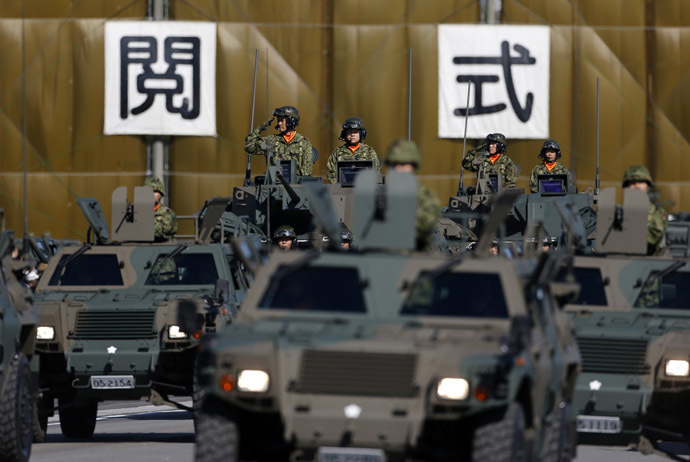
AV:Is it really wise what both South-East Asian and North Asian countries are now doing? China is the most important economic partner for many of them. There is huge economic and trade potential, as well as cultural links. Why are these countries really following Washington and its anti-Chinese policies?
GG: We can see that China has overtaken Japan in GDP, with the sheer size of its economy. We can see that China is spending more on its military capability. Yet, this would be the responsibility of any rising power. So we are at a junction in history, when a new power is challenging the hegemony of a traditional power, namely Washington, and Japan is feeling the squeeze. But it is not responding in a way that would resonate with its 70 years post-war pacifist constitution. It is in fact ripping up its pacifist constitution! It is becoming a so-called ‘normal country’, which is the word for a re-armed and militarist Japan, and that itself is a destabilizing factor.
AV:Why is Japan betting on the US/West, not on China/Asia? You began by saying that it "always did".
GG: Since Meiji, Japan has always looked over to Asia in its modernization - at that time under the slogan “strong army, strong country.” As an earlier modernizer, Japan then sought to emulate the West by creating its own colonial zone. To do this, it went to war with both Asia and Europe. Losing the war, and virtually destroyed by the US, its industrial base was rebuilt as a platform for America to wage its own wars on Asia (Korea, Vietnam) and with Japan getting richer in the bargain. From the 1960s Japan was polarized over the US treaty and base system, but under neo-conservative rule, Japan today - against all logic and its postwar “peace constitution” - seeks to further ensnare the US and allies into possibly even waging war in Asia. To re-engage Asia, Japan must come to terms with its past, something the neo-conservatives cannot contemplate.
AV:Is there a danger that the US policy in Asia could trigger an arms race and possibly lead to a military conflict, even WWIII?
GG: President Obama's “pivot to Asia” in itself is largely rhetorical alongside the natural rise of China, but the risk is that the US will become ensnared into a military conflict by politically opportunistic allies. This is already happening in US backing for Japan's claims over the disputed Senkaku/Diaoyu Islands.
The US is also backing the Abe government's position on “collective self-defense,” and has no objection to Japan selling weapons. For a country with a dangerous militarist past, any revision of the status quo surrounding Japan's “pacifist” constitution is cause for alarm. The US should be taking the side of the Japanese people – a majority who reject Abe's attempts to revise the constitution – rather than leading this nation into even more dangerous waters.
AV:Where do we go from here? Anti-Chinese Western propaganda is reaching a crescendo. There have even been several military skirmishes, recently. What would be the most logical way forward, for East Asia, in order to avoid military confrontation?
GG: The international big media notes the "China threat," yet who is the provocateur? We observe the Japanese Prime Minister in Singapore (May 30 2014) offering to lead an international coalition to check Chinese aggression, offering 'quality' Japanese naval vessels to obliging clients, as with the Philippines and Vietnam. This is madness coming from a nation without official contrition, seeking as well to unpick its "peace constitution." In the meantime, the neo-con government in Australia overreaches with matching rhetoric, together snaring the US Defense Secretary to offer his own "pivot" to the South China Sea. My spin is to let Asian nationalisms (China, Vietnam, Japan, Korea) resolve their own problems diplomatically - after all the central kingdom has been in place for several millennia - outsiders keep out, militarists watch your step, and China rise peacefully.
Geoffrey Gun is Professor Emeritus at Nagasaki University in Japan, and is a leading Australian historian, living in Japan and Macau. His latest book is called Rice Wars in Colonial Vietnam: The Great Famine and the Viet Minh Road to Power (Rowman & Littlefield).
The statements, views and opinions expressed in this column are solely those of the author and do not necessarily represent those of RT.
The statements, views and opinions expressed in this column are solely those of the author and do not necessarily represent those of RT.



